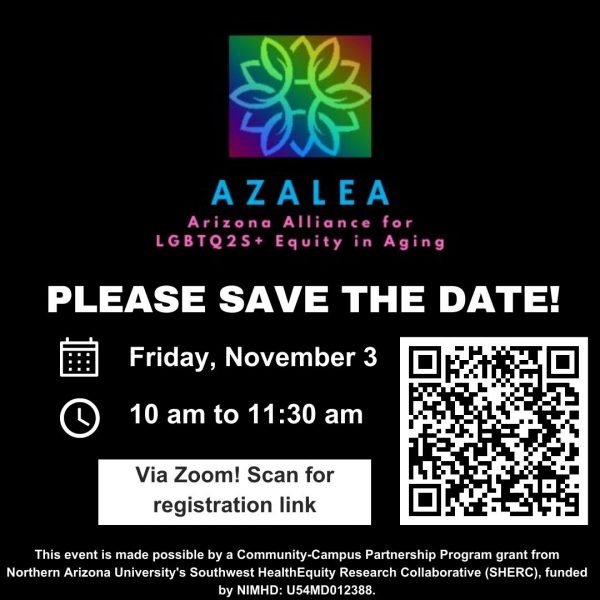Fairness First Blog
Researchers voices in health equity
The Fairness First blog represents a space where researchers share with the broader community why health equity research matters to them, how do they connect to health equity, and what is the value of community engagement in the research process.
November 1, 2023
How the dynamics between LGBTQ2S+ individuals and their peers in senior living communities affects LGBTQ2S+ care access with Megan McCoy
Assistant Professor, Department of Social Work
In this post we feature a partnership between NAU’s Dr. Megan McCoy and Tena Alonzo of Beatitudes Campus, located in Phoenix, AZ. Dr. McCoy responds to questions about how she and Tena are using funding from SHERC’s Community Campus Partnership Support Program to explore aging experiences of members of the LGBTQ2S+ community in Arizona. Read more about their collaboration and other CCPS participants here.
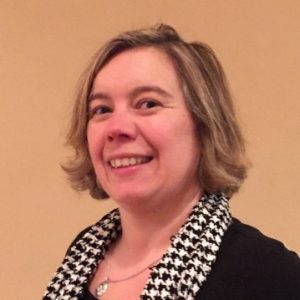
Megan C. McCoy identifies as a member of the LGBTQ+ community and is an Assistant Professor of Social Work at Northern Arizona University. She brings 22 years of direct practice, non-profit management, and community-based research experience in settings serving older adults to her role. Prior to joining NAU in 2022, she most recently served as the Director of Grant Research and Development at Center in the Park, a nationally accredited senior community center in Philadelphia, and was involved in LGBTQ aging advocacy and program development initiatives in both Philadelphia, PA and Portland, OR. Through both teaching and research, Dr. McCoy addresses the impact of historical institutionalized silences in later life and advances anti-racist and anti-ageist social work practice. Dr. McCoy’s scholarship focuses on the intersection of aging with health equity for LGBTQ+ older adults and the potential for community-based settings to function as identity-affirming spaces which promote resilience.
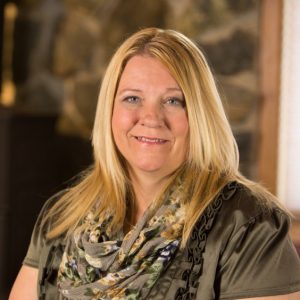
Tena Alonzo is a healthcare professional with expertise in caregiving practices for people with thinking or memory disorders. She has 38 years of experience as a long-term care provider and researcher working to enhance the lives of persons with dementia. Her expertise addresses evidence-based practices in dementia care, specifically practices that emphasize a person-first, person-centered approach that improves quality of care and quality of life for persons living with dementia. Currently, Ms. Alonzo is the founder/director of Comfort Matters®, a dementia care education program, developed at Beatitudes Campus in Phoenix, Arizona. Beatitudes Campus is a faith-based not-for-profit continuing care retirement community offering a wide spectrum of services for older people including independent living, assisted living, skilled nursing, memory support and home care services.
Q. Tell us about the topic you are exploring with the Beatitudes Campus and why it matters from a health equity perspective.
A. I’m working in collaboration with the Beatitudes Campus, a residential senior living community in Phoenix, and my colleague there, Tena Alonzo, to explore how we can make senior living communities more welcoming for LGBTQ2S+ older adults. Most people are familiar with the term “LGBTQ.” The 2S stands for “two spirit” which is a term used in some, but not all, tribal communities. We know the letters can be a mouthful but think it’s important that older adults with each of these unique identities see themselves represented in our work. From a health equity perspective, this work is important because many LGBTQ2S+ older adults fear having to remain or go back “in the closet” to access needed programs and services in later life.
Q. What made you decide to explore this topic with the Beatitudes Campus?
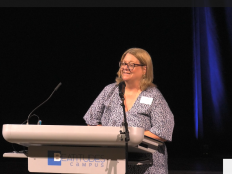
A. Tena and I connected last year when we co-presented on a panel discussion to an audience of Master of Social Work students on the topic of working with older adults. We realized that we shared a mutual passion for equity in later life and began talking about what working together might look like. The topic of LGBTQ2S+ aging equity is important to the Beatitudes Campus as an organization founded on principles of social justice and inclusion, and with staff and residents who identify as LGBTQ2S+. This topic is important to me personally as a member of the LGBTQ2S+ community, and as someone who has a 20+ year background of working in senior centers and building inclusion for LGBTQ+ older adults in communities where I’ve lived and worked.
Q. What is the element of unfairness or inequity in the issue you are addressing (in the broad context of health and wellbeing)?
A. Our project addresses the intersection of homophobia and transphobia with ageism in later life. It’s important to remember the history that LGBTQ2S+ older adults have experienced across their lives, which includes their identities being criminalized, pathologized, and stigmatized. Research tells us many lack social support, are at risk of social isolation, and experience a variety of physical and mental health challenges compared to heterosexual and cisgender peers. These social and health inequities are reinforced when mainstream aging service providers have the attitude that “we serve all older adults” and fail to acknowledge the history of discrimination LGBTQ2S+ older adults have confronted in their lifetimes. On the flipside, LGBTQ+ specific service providers tend to be youth focused, and older adults don’t always see themselves represented within their own communities.
Q. Based on your previous answer, how do you see your partnership helping to push the needle on this issue towards fairness or equity?
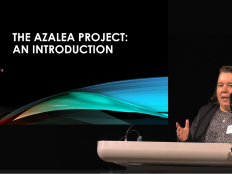
A. We’ve named our partnership the AZALEA Project which stands for the Arizona Alliance for LGBTQ2S+ Equity in Aging— and have invited others to join us! We see our project pushing the needle in two ways. First, we know that the issue of equity for LGBTQ2S+ older adults is bigger than the Beatitudes Campus and NAU. We want to engage community members and service providers from across Arizona to work together collectively to strengthen support networks for LGBTQ2S+ older adults statewide. Prior to initiating this project, we could not find any entity focused on building this kind of alliance in Arizona. Secondly, we hope to engage in a research project that explores dynamics of building inclusion and allyship among residents at the Beatitudes Campus that can potentially be replicated in other residential communities locally and beyond.
Q. What have you learned about the issue, topic, or community you’re exploring?
A. The first thing we realized is that we don’t know what we don’t know. Who else in Arizona is committed to and passionate about the issue of LGBTQ2S+ aging equity and what can we learn from them? We decided to organize an LGBTQ2S+ Aging Equity Forum, held at the Beatitudes Campus. We invited Beatitudes Campus residents, LGBTQ2S+ community members, aging services providers, LGBTQ+ providers, and tribal organizations. We had 35 attendees at the event representing a variety of organizations and communities. We are having a follow-up event on November 3 where we will report back what we learned from the forum. Some of the concerns the group raised included the need for cultural competency training, education about LGBTQ2S+ older adults, and the importance of allyship.
Q. How do you want your partnership to make a difference or change in this world? What do you hope this partnership leads to in the future?
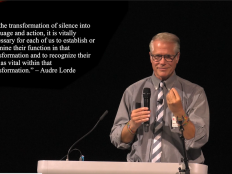
A. Our future plans for our partnership are twofold. First, we plan to develop a research proposal focused on building LGBTQ2S+ inclusion and allyship at the Beatitudes Campus. We hope this work, informed by our stakeholder group, can be a replicable model for residential senior living communities across the state, and potentially nationally. Second, after completing the CCPS program we hope the AZALEA Project stakeholder group will continue to be an ongoing alliance to inform the direction of future advocacy, programs, and research impacting LGBTQ2S+ older adults in Arizona. We’re planning three more meetings of the group during the CCPS program through which we will co-create the direction of the group moving forward.
Q. How are you engaging with community based participatory research (CBPR*) principles in your partnership with Beatitudes Campus? What’s one realization you’ve had about the process of developing a collaborative partnership?
A. I think the way we’ve created and continue to co-create the AZALEA Project stakeholder group is the primary way we are engaging CBPR. The biggest realization we’ve had thus far is that we are not in this alone! Through the LGBTQ2S+ Aging Equity Forum, we engaged with community members and service providers from within the Beatitudes Campus community and across the state. For the Beatitudes Campus residents who participated, some LGBTQ2S+ and some allies, the experience continues to be particularly meaningful. One participant shared that this was the first time in a long time that they felt connected to their identity. We had representation at our forum from Phoenix, Flagstaff, Tucson, Prescott, and the Verde Valley among others. We also recognize that we still have not reached everyone who could be at the table. In the spirit of Shirley Chisholm who said, “if there isn’t a seat at the table, bring a folding chair,” our mantra is that there are as many seats at the AZALEA Project table as people who want to join us.
*CBPR is a way of doing research that includes community members and leaders in the research process to encourage collaboration, shared learning, and capacity building. For example, community members may work with researchers to decide on a research question that is relevant to the community – rather than the researcher deciding what questions to ask.
Q. Is there a national or global context you can apply to your partnership? How is your work connected to situations happening on a national or global scale?
A. There is a national context for our work. We hope that our partnership can potentially be a model for other communities who want to organize alliances around LGBTQ2S+ aging equity and for other residential senior living communities who are working toward building inclusion.
Through the Beatitudes Campus’s relationship with national organizations, we hope to be able to share what we’ve learned beyond Arizona.
(Click on the flyer above to register or scan/screenshot this QR code and open in your photos app)
